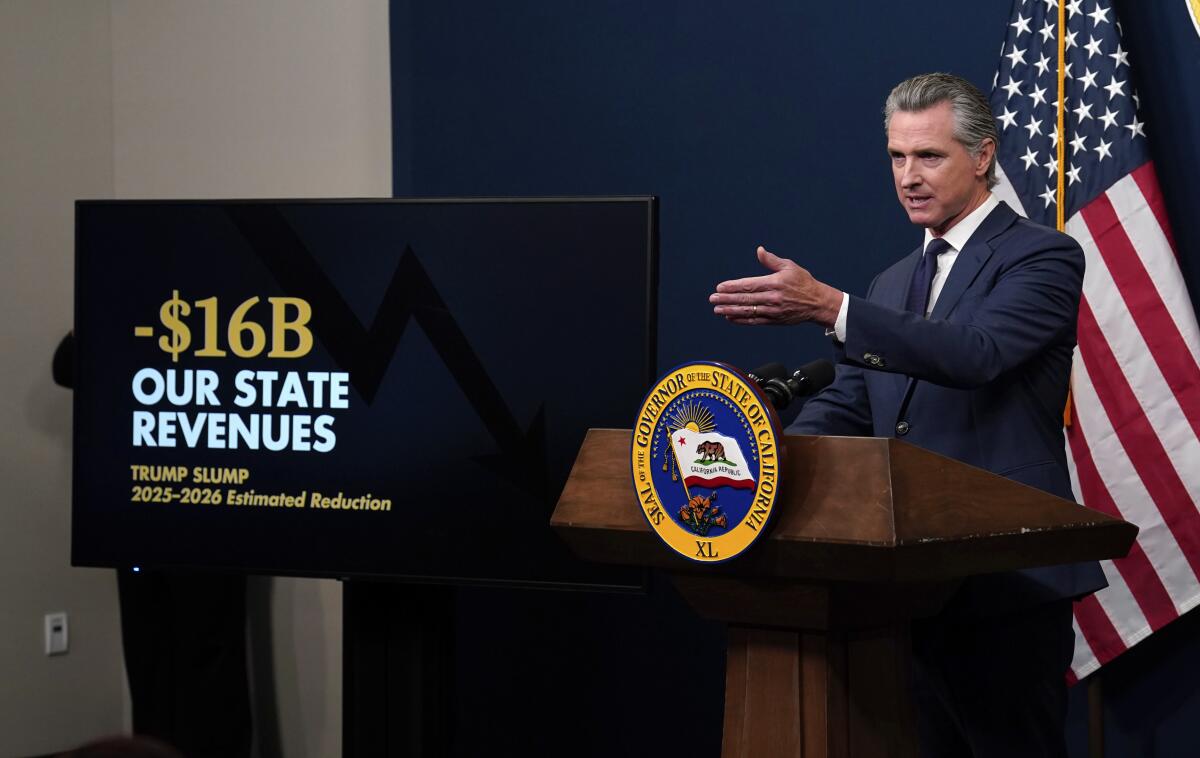WASHINGTON — The House of Representatives impeached President Clinton on Saturday, tarnishing his legacy by making him only the second president in the nation’s history ordered to stand trial in the Senate.
In approving two articles of impeachment largely along party lines, the Republican-controlled House alleged that Clinton perjured himself before a federal grand jury and obstructed justice as he sought to conceal his extramarital affair with Monica S. Lewinsky, a former White House intern.
But two other articles–charging Clinton with lying in a legal deposition in the Paula Corbin Jones sexual harassment case and abusing his presidential power–were voted down. In addition, a Democratic attempt to censure rather than impeach Clinton failed on a strict party-line vote.
And in a stunning symbol of the personal politics that has savaged a growing number of public officials at both ends of Pennsylvania Avenue, speaker-designate Bob Livingston (R-La.) shocked the packed House chamber by announcing that he will resign over the disclosure of his own adulterous affairs.
At the White House, the president urged Livingston to reconsider and, while impeachment votes were being cast, huddled in the Oval Office with one of the ministers he asked to provide spiritual guidance in his self-imposed penance for breaking his marriage vows.
With the outcome of a likely Senate trial uncertain, Livingston and other Republicans called on Clinton to resign, saying that it was the honorable thing for him to do.
Yet within hours of the votes for impeachment, the president appeared in a White House garden and–in a brace of solidarity with First Lady Hillary Rodham Clinton and scores of congressional Democrats–declared that he was determined to continue the work of his presidency “until the last hour of the last day of my term.”
Saying that he had accepted responsibility for his actions, he again invited lawmakers to censure him as punishment.
“I hope it will be embraced by the Senate,” he said. “I hope there will be a constitutional and fair means of resolving this matter in a prompt manner.”
The historic votes and successive episodes of high drama made for a political day like no other as the close of the American Century nears. It also came at the end of a year of unprecedented bitter political enmity, which gave way to only one moment of unity on the House floor when both sides rose to applaud a call for an end to “slash-and-burn-and-smear politics.”
It was from that chaotic environment that the case against Clinton was formally carried by Judiciary Committee Chairman Henry J. Hyde (R-Ill.), along with the other dozen GOP managers of the impeachment case, to Secretary of the Senate Gary Sisco.
A Solemn, Rule-Bound Senate Trial Looms
There, unless a plea bargain or some other compromise is reached, the case that has consumed Washington for 11 months will be tried in a solemn, rule-bound procedure that was last used against a president 130 years ago. If two-thirds of the Senate finds Clinton guilty on even one of the articles, he will immediately be removed from office as 42nd president of the United States.
On other fronts Saturday:
* With Livingston announcing that he will not accept the speakership when the 106th Congress convenes in January, the scramble for the position, second in the line of succession to the presidency, began anew only six weeks after House Speaker Newt Gingrich (R-Ga.) decided to step down in the face of Republican losses in the midterm elections. Rep. J. Dennis Hastert (R-Ill.), a conservative, emerged quickly as the new GOP favorite.
* Before the debate resumed Saturday morning, the first lady arrived on Capitol Hill and met behind closed doors with House Democrats to thank them for their support and ask for fairness in their votes on impeachment.
* After the debate had quieted and the votes impeaching Clinton had been cast, many Democrats left the Capitol for the White House, some riding in a blue-and-white bus that rolled down Pennsylvania Avenue.
Then crowding around the president, first lady and Vice President Al Gore outside the Oval Office, they readily accepted the administration’s gratitude for fighting to keep Clinton in the White House.
* Immediately after adopting the articles, the House appointed 13 Republican lawmakers as managers to present the case before the Senate.
Led by Hyde, they include Rep. Bob Barr (R-Ga.), who began calling for Clinton’s ouster long before the public ever heard the name Lewinsky, and Rep. James E. Rogan (R-Glendale), a junior member of the Judiciary Committee who once served as a municipal judge. Also selected was Rep. Asa Hutchinson, who holds the Arkansas congressional seat that Clinton himself once sought.
* In California’s 52-member delegation, lawmakers heeded the party line on the first article against Clinton, with all 23 Republicans supporting impeachment and 28 Democrats opposed.
But there was some splitting among GOP lawmakers on subsequent articles as Rep. Tom Campbell of San Jose voted against Articles 2 and 4; Rep. Jay C. Kim of Diamond Bar opposed Articles 2, 3 and 4; and Reps. Frank Riggs of Windsor and Brian Bilbray of San Diego voted against Article 4. Rep. George Miller (D-Martinez), recovering from hip surgery, did not vote.
* The 16 hours of debate over two days and Saturday’s votes came against the backdrop of U.S. and British strikes against Iraq. Saturday evening, Clinton announced an end to the four-night assault. But Saturday morning, the war still cast a shadow over the House chamber as lawmakers debated the future of the man who had ordered those attacks.
“Every single man and woman in Operation Desert Fox at this very moment is held to a higher standard than their commander in chief,” said Rep. Christopher Cox (R-Newport Beach). “Let us raise the standard of our American leader to the level of his troops. Let us once again respect the institution of the presidency.”
Although most observers expect Clinton to win acquittal in the Senate, the specter of a potentially long and lurid trial is so ominous that the White House, its Democratic allies and lawyers already have begun efforts to broker a bipartisan compromise to end the ouster process before Chief Justice of the Supreme Court William H. Rehnquist gavels a trial to order.
Hyde Urges Colleagues to Send Stern Message
Hyde, who led the Clinton impeachment inquiry, urged his colleagues to send a stern message to all elected officials that they must support such basic constitutional precepts as telling the truth under oath.
“Equal justice under the law, that’s what we’re fighting for,” he said in a closing statement.
“And when the chief law enforcement officer trivializes, ignores, shreds, minimizes the sanctity of the oath and justice is wounded and you’re wounded and your children are wounded, follow your conscience and you will serve the country.”
On the opposite side of the aisle, House Minority Leader Richard A. Gephardt (D-Mo.) argued that censure of the president is the proper course.
“America is held hostage to tactics of smear and fear,” he warned. “Let all of us here today say no to resignation, no to impeachment, no to intolerance of each other and no to vicious self-righteousness.”
But the politics of rancor are likely to carry over into the Senate, where the Republicans hold a 55-45 majority. Senate Majority Leader Trent Lott (R-Miss.) has said that he expects a flurry of pretrial motions early next month by the Clinton team. He said that it will be difficult to determine when the trial will begin.
“That time,” he said, “will depend greatly on the president and his lawyers.”
Meanwhile, he added, the Senate legal counsel will be presenting an explanation of historical background and current rules governing impeachment proceedings.
“The process,” Lott said, “is governed both by the Constitution and by our rules and precedents.”
In 1868, President Andrew Johnson escaped ouster on the thinness of a single Senate vote. In 1974, President Nixon resigned before the full House could vote on the three articles of impeachment voted against him by the Judiciary Committee.
The two articles approved by the House accuse Clinton of lying under oath during his appearance before a grand jury and obstructing justice in attempting to conceal his relationship with Lewinsky.
Article 1 says that Clinton “willfully provided perjurious, false and misleading testimony to the grand jury” about his relationship with Lewinsky, his efforts to influence the testimony of witnesses and gifts the couple exchanged. It passed on a 228-206 vote, with five members from each side breaking party ranks.
While Clinton’s lawyers have admitted that the president may have been misleading in his testimony, they have bluntly denied that he intentionally lied.
Article 3 says that Clinton “prevented, obstructed, and impeded the administration of justice, and to that end engaged personally, and through his subordinates and agents, in a course of conduct or scheme designed to delay, impede, cover up and conceal the existence of evidence and testimony.”
The White House has argued that independent counsel Kenneth W. Starr twisted the facts against the president to make his actions appear incriminating, but the vote was 221 to 212, with 12 Republicans voting no and five Democrats voting yes.
Articles 2 and 4, which failed, accused Clinton of committing perjury in a deposition in the Jones case and abusing his power by submitting false statements in written responses to the Judiciary Committee. Article 2 was defeated, 229 to 205, and Article 4, 285 to 148.
Impeachment Grew All but Certain
Although impeachment appeared a long shot a month ago, it was all but certain when the bell rang for the first vote.
The corps of undecideds who held the president’s fate in its hands turned on the president in the end. Only five Republicans bucked their party’s leadership to oppose all four articles of impeachment. Just as many Democrats favored Clinton’s ouster.
Rep. Gene Taylor of Mississippi was the only Democrat to vote for all four articles. Four other Democrats joined him in voting for the first three articles: Reps. Virgil H. Goode Jr. of Virginia, Ralph M. Hall of Texas, Paul McHale of Pennsylvania and Charles W. Stenholm of Texas.
Saturday’s debate began after the obligatory Pledge of Allegiance, followed immediately by a loud and sustained “aawwwww” sound from Democrats who appeared to be making the sound of gagging.
It was clear that there would be no love lost on either side.
In stark contrast to the scene of Friday’s debate, almost every seat on the House floor was taken and the visitors’ and press galleries were filled to capacity. Lines of tourists and spectators snaked along the third-floor hallways.
Print reporters jammed the Speaker’s Lobby, just off the House floor, and on the sweeping East Lawn of the Capitol television correspondents jostled shoulder to shoulder for position in front of their camera crews.
Inside the House chamber, the first to rise in debate was Rogan. “The evidence is overwhelming; the question is elementary,” he said.
‘He Repeatedly Perjured Himself’
What this impeachment would be all about, he said, was Clinton’s initial intent to do anything he could to get out from under the Jones lawsuit.
“The president was obliged under his sacred oath faithfully to execute our nation’s laws,” Rogan said. “Yet he repeatedly perjured himself and obstructed justice, not for any noble purpose, but to crush a humble, lone woman’s right to be afforded access to the courts.”
Next to speak was Rep. Barbara Lee (D-Oakland). “The Republican process is cynical and it’s dangerous. It will be recorded that they stood on the wrong side of history.”
Rep. Lindsey O. Graham (R-S.C.), a Judiciary Committee member, evoked the name of Nixon and noted that the same panel had voted articles of impeachment against him during the Watergate scandal.
While President Nixon cheated the political system by trying to hide a political break-in, he said, Clinton subverted the country’s legal system.
“Let it be said that any president who cheats our institutions shall be impeached,” he said.
But it was Livingston’s remarks that set the House on fire.
Addressing the president, the speaker-nominee said that Clinton had “done great damage to the nation over this past year.”
“You have the power to terminate that damage and heal the wounds that you have created,” he thundered. “You, sir, may resign your post.”
Democrats Roar With Disapproval
To Livingston’s right, Democrats roared with disapproval. With Rep. Ray LaHood (R-Ill.) presiding in the speaker’s chair and pounding his gavel, Democrats screamed: “No, you resign! You resign!”
And then Livingston did just that, announcing that he would not run for speaker next month and would resign in six months from his seat of 11 years.
The room gasped. The Democrats were suddenly silent (although some would later rise to ask him to reconsider) and when Livingston offered one final “God bless America” in closing, politicians on both sides stood and applauded.
Other speakers followed. Rep. Christopher Shays (R-Conn.), who in his angst called a town meeting last week to help him decide how to vote, announced that he was for the president.
“We’ve all tried to do our best,” he said. “And we will all have to live with our votes the rest of our lives.”
Some spoke with fury.
Rep. J.C. Watts (R-Okla.), a former football star and rising voice in the GOP, spoke with emotion about how a vote to uphold the law was a vote for “our children.” In a pointed reference to the perjury allegations against Clinton, Watts said: “Ask your children. The kid who lies doesn’t last.”
Equally passionate was Rep. John Lewis (D-Ga.), a veteran of the civil rights campaigns of the 1960s who asked for the two sides to come together.
He recalled a violent storm when he was a youngster in Alabama, huddled with his family inside their home.
“We never left the house,” he said. “The wind may blow, the thunder may roll, the lightning may flash, but we must never leave the American house. We must stay together as a family, one house, one family, the American house, the American family.”
When lawmakers had debated impeachment for a final two hours, they spent another hour discussing the Democrats’ censure alternative.
Rep. Charles E. Schumer (D-N.Y.), who in January will join the Senate, said: “The rule of law requires that the punishment fit the crime. Allow us to vote for censure, the appropriate punishment under the rule of law.”
But Rep. Charles T. Canady (R-Fla.), who like Schumer sits on the Judiciary panel, rejected the proposal as unsuitable.
“The constitutional method is impeachment by the House and trial in the Senate,” he said. “Other methods may seem to us more convenient or more comfortable, but our standard cannot be comfort or convenience.”
The House voted, 230 to 204, on a procedural motion that defeated Democrats’ effort to censure.
Then came the votes on impeachment.
And with that, the lame-duck session of the 105th Congress adjourned.
Times staff writers Edwin Chen, Melissa Healy, Robert L. Jackson, Art Pine and Alissa J. Rubin contributed to this story.
Times on the Web: Video clips from Saturday’s impeachment proceedings, Times political writer Ronald Brownstein’s audio analysis and a complete list of House members’ votes are on The Times’ Web site: https://www.latimes.com/scandal
IMPEACHMENT
* Looking Ahead: The stage is set for a partisan struggle focused on the question of whether the president lied under oath. A48
* Legacy Stained: Clinton can claim other achievements, but history will remember him as the second president to be impeached. A48
* Reaction From Right: Conservatives avoid celebrating even though they see vindication of effort to cut short Clinton’s career. A45
* View from home: Weary Arkansans describe feeling a mixture of melancholy and disengagement over the historic vote. A47
(BEGIN TEXT OF INFOBOX / INFOGRAPHIC)
Next Step: The Senate
On Saturday, just after the historic vote to impeach President Clinton, the House appointed 13 managers who will act as prosecutors in the Senate trial.
The appointment is one of several traditions inherited from the British legal system under which the U.S. Senate has conducted impeachment trials since 1868. Here are some of the others:
The Proceedins:
* The Senators each take an oath as a juror.
* The Chief Justice of the Supreme Court serves as judge and has the power to make and enforce rulings.
* The Senate has subpoena power. Witnesses are sworn in.
* The accused is advised of the charges against him, but the trial will proceed with or without his presence.
* One person on each side–the prosecution and the defense–makes an opening argument.
* Any witness called by one side must be cross-examined by the other side.
* Senators are not to talk during the trial. If a Senator wants to ask a question of a witness, the Senator must submit that question in writing to the chief justice.
* The Senate doors must remain open unless the Senators are deliberating.
* The vote for each article of impeachment is taken separately and without debate. During the deliberations, Senators may speak to each other within limited rules set down by the chief justice.
* Two-thirds vote (67) needed to remove president
*
The Senate
The political party makeup of the 106th Senate did not change from the previous Senate.
Republicans: 55
Democrats: 45
*
Newly elected senators
Republicans
Jim Bunning (Ky.)
Michael D. Crapo (Idaho)
Peter Fitzgerald (Ill.)
George Voinovich (Ohio)
*
Democrats
Evan Bayh (Ind.)
John Edwards (N.C.)
Blanche Lamber Lincoln (Ark.)
Charles E. Schumer (N.Y.)
*
Senators not returning in January
Republicans
Dan Coats (Ind.)
Alfonse M. D’Amato (N.Y.)
Lauch Faircloth (N.C.)
Dirk Kempthorne (Idaho)
*
Democrats
Dale Bumpers (Ark.)
Wendall H. Ford (Ky.)
John Glenn (Ohio)
Carol Moseley-Braun (Ill.)
Researched by TRICIA FORD / Los Angeles Times




